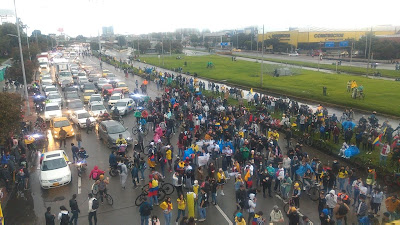@wwaycorrigan
[Listen to an audio version of this blog entry here.]
'Hey Johnny, what are you rebelling against?'
'Whaddaya got?'
Some of you will recognise those lines from a classic scene in the 1953 US crime film The Wild One, with Marlon Brando playing protagonist Johnny Strabler. It was parodied, for those of us of a much younger age, some 40 years later in The Simpsons by Lisa (taking Johnny's role) and Principal Skinner.
 |
| Protesters block Bogotá's Autopista Norte. |
A taxing issue
Not wanting to make light of the very real issues at the heart of the latest wave of protests in Colombia, in some ways it seems as if the protesters are against pretty much anything the state represents. One could say, much rhetoric, little real detail.The spark that led to this so-called Paro Nacional, National Strike, was the controversial tax reform proposals. While many other grievances were highlighted by the various organisations officially behind the mobilisation that started on 28 April, it seems unlikely that the movement would have garnered as much support if it hadn't been for these mooted tax changes. (It must be said, the numbers protesting in recent days aren't massive by any means but they are causing widespread disruption via roadblocks, damage to public transport and such like.)
Across the class spectrum, there was widespread anger at the Ministry of Finance's proposals. It matters little whether this anger has been justified or not. The narrative was set that the government was looking to take more than was fair from the middle and lower classes to increase its revenues, something it badly needs to do.
For one, looking to widen the income tax base, as these proposals did, doesn't seem too unreasonable in a country where a small percentage of the population actually contributes in this way. Nonetheless, when state politicians earn about 30 times the national minimum wage and there's a belief that corruption is commonplace among the controlling classes and wealthier folk, asking the masses to fork out more in such a blatant manner was always going to be met with resistance.
'Taking it as a given that it's Colombia's centre-left/left behind most of this, if there was a presidential election next week, one would be taking a significant gamble betting on politicians from that side of the spectrum to be poll toppers.'
In the end, President Iván Duque's
administration capitulated. The Finance Minister resigned and the tax
reform proposals have been binned. They'll be back in some form again as
the country must find ways to raise revenues (or cut spending) — my podcast interview from last year
with the renowned economist Leopoldo Fergusson gives a good overview of
the situation together with some considered ideas of what could be
done.
So with the tax reform proposals shelved, the minister
responsible sent packing and President Duque promising an inclusive
national dialogue, why have the protests continued? (They are into day
nine as I write.)
Police state
The biggest reason is the response of state security forces. Depending on whose figures you believe, we've had either over 20 protest-related deaths or over 30. Culpability for the majority of these has been laid squarely at the police and individuals acting on their behalf. In this age where social media dominates the discourse, deciphering fact from fiction is difficult, to say the least.All this follows on from previous protest fatalities, the most recent spate occurring in Bogotá in September 2020 when violence erupted after the death at the hands of police of Javier Ordóñez, something I wrote about at the time.
This time around it's the south-western city of Cali that has borne the brunt of killings and violence, although all major urban centres in the country have seen some level of violent disturbances.
Thus, protesters' ire is yet again directed at police brutality. Each morning since 28 April we've woken up to news of another killing allegedly at the hands of state forces. As long as that continues, the chances of the protests petering out, as has happened previously, seem low.
The official organisers of the National Strike are scheduled to meet with government officials in the coming days. Whether this will result in an easing of tensions remains to be seen.
How much the various workers' unions are actually in control of the movement at this stage is highly debatable.
For many of the younger protesters, it would seem that nothing short of President Duque's resignation will placate them. That is extremely unlikely to happen. We are, after all, just a year away from a presidential election.
What's more, as alluded to above, the extent to which those protesting represent the majority of public opinion is difficult to measure. Taking it as a given that it's Colombia's centre-left/left behind most of this, if there was a presidential election next week, one would be taking a significant gamble betting on politicians from that side of the spectrum to be poll toppers.
While the more "visible" problem of police brutality is now driving the protests, the broader issue here is — and always has been — inequality in all its manifestations. For that, there is no quick-fix solution.
Of course, this doesn't mean that decision-makers just shrug their shoulders and say 'it is what it is.' The goal of achieving a more equal society has to start somewhere. One of those places, it can be argued, is with a fairer redistribution of wealth, i.e. tax reform and the like. Ring a bell?
In the same way, referring back to our opening lines, rebelling against everything with little rhyme or reason to proceedings is unlikely to lead to a glorious revolution.
Go ahead, tear down the structures and start again. To do that, one has to be prepared to shoulder the cost of reconstruction.
_______________________________________________________________
Listen to Wrong Way's Colombia Cast podcast here.
Facebook: Wrong Way Corrigan — The Blog & IQuiz "The Bogotá Pub Quiz".
No comments:
Post a Comment